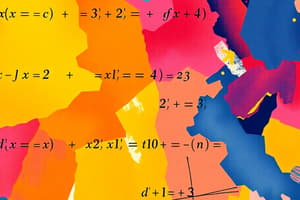Podcast
Questions and Answers
What is the degree of a polynomial?
What is the degree of a polynomial?
The degree of the term with the highest degree in a polynomial.
What is the degree of a term of a polynomial?
What is the degree of a term of a polynomial?
The sum of the exponents on the variables in a term of a polynomial.
What is a linear equation?
What is a linear equation?
A mathematical statement that two linear expressions, or a linear expression and a constant, are equal.
What is a linear expression?
What is a linear expression?
What is a linear inequality?
What is a linear inequality?
What is the standard form of a linear equation?
What is the standard form of a linear equation?
The ______ is the highest power or the sum of the powers (exponents) on the variables of a term in a polynomial.
The ______ is the highest power or the sum of the powers (exponents) on the variables of a term in a polynomial.
A linear ______ is a polynomial equation of the first degree.
A linear ______ is a polynomial equation of the first degree.
What is slope-intercept form?
What is slope-intercept form?
What is a piecewise function?
What is a piecewise function?
An example of a piecewise function is the greatest ______ function.
An example of a piecewise function is the greatest ______ function.
What is absolute value?
What is absolute value?
The absolute value of a positive number is the ______ itself.
The absolute value of a positive number is the ______ itself.
The absolute value function is a ______ linear function.
The absolute value function is a ______ linear function.
What is composition of functions?
What is composition of functions?
A function composed with its inverse function will always equal ______.
A function composed with its inverse function will always equal ______.
Every linear function with a ______ slope will have an inverse function.
Every linear function with a ______ slope will have an inverse function.
What is Gaussian elimination?
What is Gaussian elimination?
What is a linear system?
What is a linear system?
Flashcards are hidden until you start studying
Study Notes
Polynomial Definitions
- The degree of a polynomial is determined by the term with the highest degree.
- The degree of a term of a polynomial is calculated by summing the exponents of the variables in that term.
Linear Equations and Expressions
- A linear equation expresses equality between two linear expressions or between a linear expression and a constant.
- A linear expression is defined as a polynomial of the first degree.
Inequalities
- A linear inequality indicates that two linear expressions or a linear expression and a constant are not equal.
Standard Form
- The standard form of a linear equation is expressed as Ax + By = C, where A and B cannot both be zero.
Slope-Intercept Form
- The slope-intercept form of a linear equation is characterized by y = mx + b, where m represents the slope and b represents the y-intercept.
Functions and Their Definitions
- A piecewise function operates differently over various intervals within its domain.
- An example of a piecewise function is the greatest integer function, which rounds down to the nearest integer.
Absolute Value
- The absolute value measures the distance of a number from zero on the number line.
- For any positive number, the absolute value equates to the number itself.
- The absolute value function is classified as a piecewise linear function due to its differing treatments based on input values.
Composition of Functions
- The composition of functions merges two functions by using the output from one as the input for another.
- When a function is composed with its inverse, the result will always yield x, indicating a return to the original input.
- Only linear functions with a nonzero slope possess an inverse function.
Solving Systems of Equations
- Gaussian elimination is a strategic procedure for solving systems of equations by systematically eliminating variables through additive or subtractive operations on the equations.
Linear Systems
- A linear system is a collection of two or more linear equations or inequalities viewed collectively.
Studying That Suits You
Use AI to generate personalized quizzes and flashcards to suit your learning preferences.



